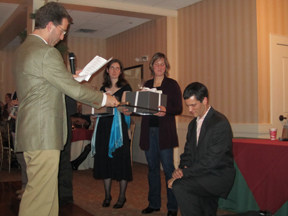ONLINE EXCLUSIVE: King Arthur Flour’s Recipe for Success
 |
||
| Steve Voight, president and CEO (wielding the sword) and Martin Philip, director of bakery operations (knighted as “Grand Duke Martin, Operatic Overseer of Ops, and Baron of Breadstuffs”). Philip is a former opera singer, hence the “operatic” in his title. |
Lea Tonkin, editor in chief
Passionate employee-owners power The King Arthur Flour Company’s kingarthur.com continuous improvement culture. The Norwich, VT, company supplies flour and other baking ingredients, tools, recipes, and helpful hints for home and professional bakers. It is the No. 2 selling national brand of flour.
“A lot of our lean culture stems from the fact that we are an Employee Stock Ownership Plan (ESOP) company, although that’s not the only factor,” said Tom Payne, director of marketing. “People here have the sense that they are respected and their opinions are valued. It’s not the leaders at the top making all the decisions.” Payne presented “The Right Ingredients in our Recipe for Success” during the 2011 AME annual conference in Dallas.
Ownership comes with responsibilities and performance expectations. “We are also a culture-building group. We cultivate successes, welcoming new members into the fold,” Payne said. “Our ESOP communications committee keeps our culture strong.” Volunteer committee members serve for two years, keeping ideas fresh. Rotating committee membership exposes more people to company operations details, creating shared understanding.
The committee also plans functions and gatherings such as the annual company picnic every summer and recognition events. In the Twelfth Night party held after the Christmas holidays, employees with 10-15 years’ service are “knighted.” A supervisor writes a story about each new knight, and the stories are published in a booklet. Every five years, employees are re-knighted. “You can choose a whimsical title,” Payne said. For example, the director of sales is the Grand Duke of Deals and Prince of Exalted Sales Performance. Although the company doesn’t trade on the King Arthur legend in its marketing program, buildings at the Norwich campus sport names such as Camelot and Excalibur.
Consistent Top Performance
Employee-owners take pride in consistently providing top-quality products and nurturing a high-performance, positive work environment. King Arthur Flour was named one of the 20 best places to work in Vermont during 2011, also garnering the Vermont Governor’s Award for Outstanding Workplace Safety in the large business category ($100 million in sales). The company has 289 employees (hourly full time and part time, salaried, seasonal/on call, and others).
Payne shared several suggestions for creating and sustaining high-performance culture:
- Create a volunteer employee committee to recognize successes, explain company policies, and encourage feedback. Set new committee goals each year and run it as a business function, not just a party-planning group.
- Broadly share senior leadership’s plans for the coming year. King Arthur Flour’s board of directors and senior management develop three critical issues for the year, inviting related employee engagement and action. For example, a focus on food safety issues resulted in development of better protocols and standardized practices in the company’s café, bakery, plant, and mixing center.
- Use outside educational resources when appropriate. “When we wanted lean to take on more importance in the company, we partnered with the Vermont Manufacturing Extension Center,” Payne said. “We started introducing lean in quality, then the warehouse, operations, marketing, and finance. This program helped us to become more efficient and keep the improvement momentum going.”
- Don’t forget continuing basic education needs. “You have new people coming in. We offer a program called brainfood classes: how our flour is milled, what businesses are we in, how we do certain procedures, basic bread baking, etc. The classes bring together people who don’t normally interact, building more flexibility in the organization,” Payne said. These classes are offered throughout the year, on company time.
- Every employee annually receives 40 hours’ time to spend in volunteer activities. It’s another way to build teamwork spirit and engagement. Sometimes departments, or several departments, volunteer for projects such as Habitat for Humanity home building.
- Recognition counts. “We have a weekly intranet newsletter, where supervisors and others recognize jobs ‘well done.’ We also have monthly recognition meetings for certain achievements,” Payne said. “Sometimes employees want to hear that they are doing a good job.”


